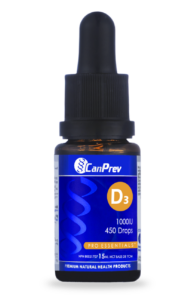Better together: Vitamin D3 and calcium
The role of vitamin D3 in calcium absorption
More than just bone benefits
The effects of low vitamin D3 or calcium levels
How to get enough vitamin D3 and calcium
Food sources and sun exposure
Supplementation: When and why?
Choosing the supplement for you: Bioavailability and absorption
Supplemental choices for bone health from CanPrev
CanPrev D3
- 1000IU and2500IU dosages

- Available in drops and softgels
- MCT or coconut oil base for enhanced absorption
CanPrev Calcium
- Calcium Malate Bis-Glycinate 200 featuring 200mg of chelated calcium for easy absorption per vegetable capsule
- Additional complete bone health formulas include Healthy Bones
Vegan and Inno-Cal-Mag Advanced with minerals like magnesium, zinc, and silicon for added support
Supporting good bone health begins with consistency in every day habits, like keeping a balanced diet, getting regular sunlight and daily exercise. When habits aren’t enough, turn to supplements to help fill the gaps, and support healthy bones long term. To learn more about the unique relationship between vitamin D3 and calcium along with evidence-based supplement options visit vitaminD3.ca.
Sources:
Calcium and Vitamin D: Important for Bone Health
Vitamin D and Intestinal Calcium Absorption
Chapter 5The parathyroid glands and vitamin D
The Role of Vitamin D in the Endocrinology Controlling Calcium Homeostasis
Vitamin D and Calcium in Osteoporosis, and the Role of Bone Turnover Markers: A Narrative Review of Recent Data from RCTs
Related Articles
Better together: Vitamin D3 and calcium
The role of vitamin D3 in calcium absorption
More than just bone benefits
The effects of low vitamin D3 or calcium levels
How to get enough vitamin D3 and calcium
Food sources and sun exposure
Supplementation: When and why?
Choosing the supplement for you: Bioavailability and absorption
Supplemental choices for bone health from CanPrev
CanPrev D3
- 1000IU and2500IU dosages

- Available in drops and softgels
- MCT or coconut oil base for enhanced absorption
CanPrev Calcium
- Calcium Malate Bis-Glycinate 200 featuring 200mg of chelated calcium for easy absorption per vegetable capsule
- Additional complete bone health formulas include Healthy Bones
Vegan and Inno-Cal-Mag Advanced with minerals like magnesium, zinc, and silicon for added support
Supporting good bone health begins with consistency in every day habits, like keeping a balanced diet, getting regular sunlight and daily exercise. When habits aren’t enough, turn to supplements to help fill the gaps, and support healthy bones long term. To learn more about the unique relationship between vitamin D3 and calcium along with evidence-based supplement options visit vitaminD3.ca.
Sources:
https://www.niams.nih.gov/health-topics/calcium-and-vitamin-d-important-bone-health
https://pmc.ncbi.nlm.nih.gov/articles/PMC3405161/
https://www.ncbi.nlm.nih.gov/books/NBK24/
https://pmc.ncbi.nlm.nih.gov/articles/PMC5529228/
https://pmc.ncbi.nlm.nih.gov/articles/PMC9944083/